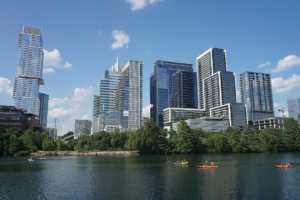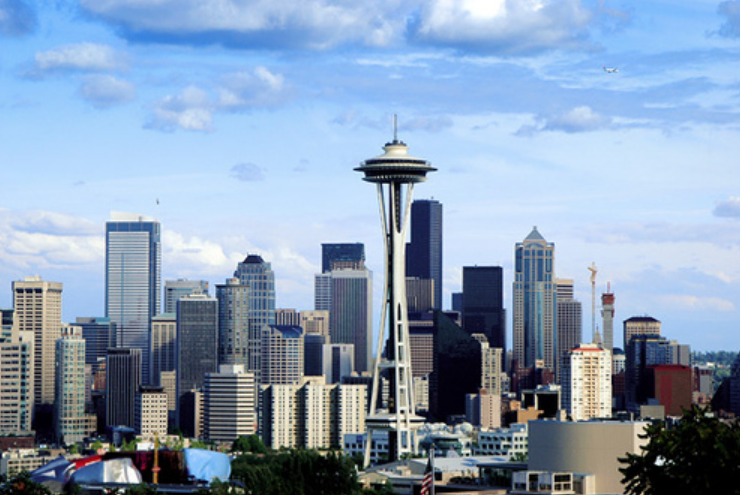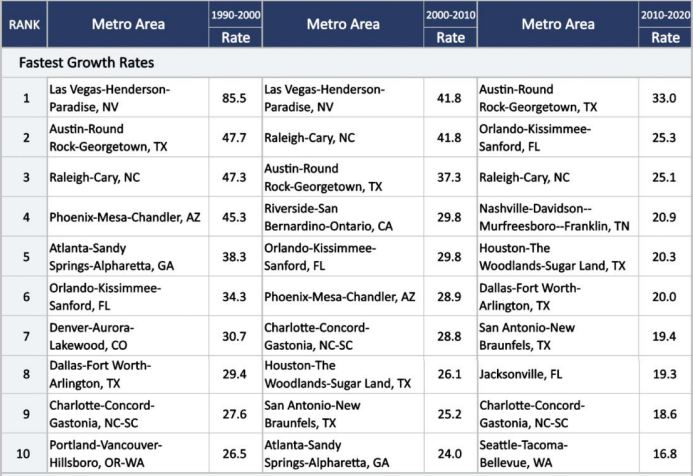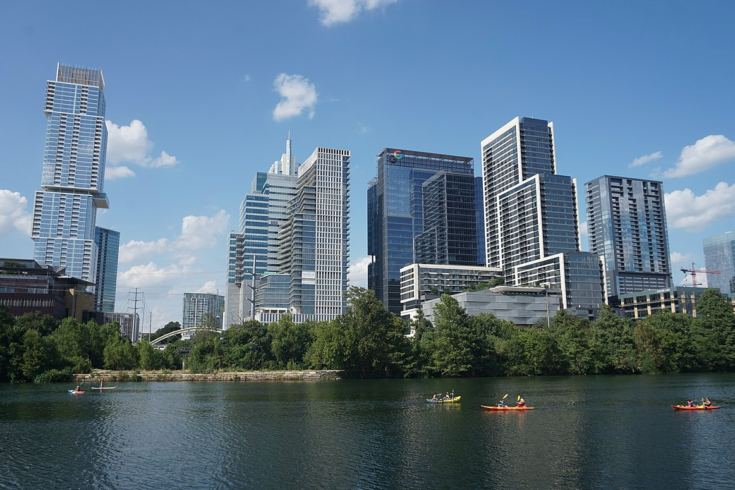What would you end up with if you took a bunch of Democratic voting social liberals from California and transplanted them to an entirely different state with no income tax and a light touch regime of business regulation?
You’d end up with the fastest growing city in America:

Austin grew by 33% between 2010 and 2020, far faster than any other large metro area.
Back in the 1960s, there was a movie entitled How to Succeed in Business Without Really Trying. Austin residents vote Democratic, but they have not been allowed to try out the sort of policy regime that you see in other Democratic areas, such as California. Austin is an island of liberalism plunked down in the middle of conservative Texas.
So what can we infer from Austin’s amazing success?
It seems as though people are voting with their feet for a mix of policies that are socially liberal and economically conservative. Interestingly, the neoliberals who like Austin’s policy regime don’t have a home in either major political party. A two party system can only represent a limited set of policy mixes, and Austin’s is not one of them.
Of course Austin is in the sunbelt and benefits from warm sunny weather. But then so does California, which is losing population.
So what’s the fastest growing big city in the cold rainy north? Seattle:

Socially liberal Seattle is embedded in a state with no income tax, due to the fact that Washington’s constitution forbids progressive income taxes. That makes instituting an income tax a hard sell, as even middle class residents understand that they would have to pay higher taxes.
Even though only a small fraction of states levy no income tax, 8 of the 10 fastest growing big cities (during the 2010s) are located in one of those states. The following population growth data is provided by the Brookings Institute:

P.S. Elon Musk considers himself to be socially liberal and economically conservative, and recently moved his business from California to Austin.
P.P.S. Bloomberg published a story on a couple of new “supertall” skyscrapers being build in Austin. Even more notable than their height is that they are both residential towers. High rise living tends to be more popular with socially liberal people. Perhaps they enjoy looking down on us. 🙂


READER COMMENTS
vince
Jan 16 2023 at 8:41pm
Those Democratic voting liberals fled Democratic voting liberal California, didn’t they? Maybe they learned something.
Rebes
Jan 16 2023 at 10:17pm
There is another aspect to the list. It shows how concerned people really are about climate change.
Because if you really are concerned, Buffalo and Detroit welcome you.
Jim Glass
Jan 16 2023 at 10:27pm
No need to be from California. Two of my sons have moved from totally left-wing governed Manhattan, New York City, to Austin.
They did so separately and for completely different reasons, and have completely different politics, but there they both are.
David S
Jan 17 2023 at 2:09am
It’s amazing how a city can grow if it issues building permits in response to demand. Incidentally, New Hampshire has never had an income tax but its zoning policies across several hundred municipalities generally prohibit the construction of anything but single family homes. Consequently, it’s tapped out on a suburban building boom in its coastal area while its primary cities are usually dead zones.
MarkW
Jan 17 2023 at 6:37am
There is some weird path dependence involved — some blue states operate with deeply-ingrained, seemingly permanent policies enacted when they were more conservative. This would include prop 13 in California, no state income tax in Washington, and the ‘Taxpayer Bill of Rights’ in Colorado. Progressive politicians in those states would love to get rid of all three of these, but the majority of voters (while voting left generally) remain too attached. Prop 13 seems immortal, but I wouldn’t be shocked to see changes in Washington or Colorado in the next few years. And, of course, Seattle itself passed a payroll tax applying to businesses with high wage employees (aka ‘Amazon Tax’) and Amazon responded by halting expansion in Seattle and shifting growth plans to outside the city.
And then there’s the blue city island in a red (or purple) state effect. The voters in Austin are by no means fiscally conservative — they’re every bit as progressive on economic issues as they are on social issues. It’s just that state laws and rules limit their scope of action. It has been the same, on a smaller scale, in my hometown of Ann Arbor. Prosperous and very blue but, up until now, protected from itself by a state that has had divided government for decades. But now, Democrats have control of all the state offices and both houses of the legislature. Will they enable our city government to realize even the most ‘ambitious’ of its progressive goals, which include things like rent control, banning natural gas hookups, requiring all residents and businesses to use 100% renewable power (possibly by creating a city-owned utility) and setting the speed limit to 25mph on all roads within the city?
MarkLouis
Jan 17 2023 at 9:09am
I have a feeling these very same people would not vote for economically conservative policies.
MarkW
Jan 17 2023 at 10:27am
No they wouldn’t. But it doesn’t matter! At least for now. In Texas, lefty Austin residents are protected from themselves by the conservative state government (which is also in town). That looks to be a pretty stable situation. This is less true in Seattle and Denver because the economically conservative state governments are gone — city progressives are unwittingly dependent on state laws passed during earlier eras not being overturned (likely while actively pushing to overturn them).
Monte
Jan 17 2023 at 12:08pm
LOL!!! Yes! We (the masses) are best observed from commanding heights, where our proper care and feeding by liberal elites takes place.
Looking up, how can we argue? We’re told skyscrapers can save cities by making them more affordable and architecturally interesting. Tall buildings are greener than sprawl, they say, and foster social capital and creativity.
Yes. We can only assume Austinites have risen above the fray of party politics and overcome the stereotypes that Dave Barry so humorously drew attention to when he asked:
Scott Sumner
Jan 17 2023 at 12:53pm
David and Mark, Those are good examples.
Spencer
Jan 17 2023 at 2:41pm
The great divide. Taxes and zoning laws.
Laurentian
Jan 17 2023 at 2:41pm
Isn’t this rather unsustainable though? Won’t too much growth lead to the end of the economically conservative state government eventually? And you are just hoping that this economically conservative state government will leave some policy that is hard to overturn and you are assuming that tha5 policy will not be overturned eventually?
After all wasn’t the same happening in California, Colorado and Washington until suddenly it didn’t?
Reminds me of one of the anti-National Divorce arguments that California needs out of state Federal Republicans to keep the state Democrats in check.
Or one anti-Brexit argument that the EU needs Euroskeptic Brits to keep them in check.
You know for a self-reliant forward-thinking ideology liberalism sure depends a lot on conseratives and reactionaries to prevent them from harming themselves.
Laurentiam
Jan 17 2023 at 3:00pm
The real problem seems to be urbanization. Many classical liberals realized that wealthy educated urbanites tended to be liberals so they decided that everyone should be a wealthy educated urbanite.
Have the peasants move into the city, learn how to read, stop being Catholic and buy consumer goods made using the newest tech and foreign materials and viola permanent liberal majority. Oh wait except that didn’t happen…
And they also assumed that since urbanites have to buy everything in stores they must love laissez-faire economics. Surely there was no way urbanites would vote for politicians that would raise the price of food, energy or raise inflation would they?
Scott Sumner
Jan 17 2023 at 5:31pm
“Many classical liberals realized that wealthy educated urbanites tended to be liberals so they decided that everyone should be a wealthy educated urbanite.”
If you’d like to be taken seriously, you might want to think twice before making such sweeping statements.
Laurentian
Jan 17 2023 at 5:59pm
https://www.humanprogress.org/cities-are-central-to-human-flourishing/
cities are the engines of human liberation and economic growth.
….
Cities also offered better schools, leading to higher levels of literacy and political consciousness and, in time, democratization.
…
In many countries today, cities are the centers of innovation, engines of growth, and home to the richest segment of the population – just think of Delhi, London, New York, Shanghai, Seoul and Tokyo. In fact, the World Bank found that “No country has grown to middle income without industrializing and urbanizing. None has grown to high income without vibrant cities.”
Scott Sumner
Jan 18 2023 at 1:32pm
In other words, you have no evidence to support your claim that classical liberals believe everyone should live in cities. Just as I thought.
Thomas Lee Hutcheson
Jan 17 2023 at 5:33pm
Austin’s land use policies are certainly not neo-liberal. It could grow much faster with easier upzoning.
Scott Sumner
Jan 18 2023 at 1:33pm
Agreed. But just imagine what their zoning rules would be like if they were not located in Texas. It’s still the fastest growing big city in America.
Laurentian
Jan 17 2023 at 6:16pm
Also why are the wealthy educated urbanites the biggest advocates if degrowth? Shouldn’t it be country yokels who hate growth?
And why did classical liberalism collapse despite it successes? And why is the same happening to neoliberalism?
And all of these collapsed after increased urbanization, not deurbanization.
Rajat
Jan 17 2023 at 7:14pm
I also thought of New Hampshire as an example of a no-tax and relatively progressive area (at least on same-sex marriage and abortion according to this Vox piece), but I wasn’t aware of its restrictive zoning laws. Still, for people looking to set up businesses and buy single-family houses not far from Boston, towns like Nashua seem like they could be attractive. As a former Bostonian, Scott, tell me what I’m missing.
David S
Jan 18 2023 at 10:51am
Rajat,
As a NH native, but current resident of Massachusetts, I can confirm everything you commented on. Nashua, or more accurately–its suburban neighborhoods, has been an attractive destination for homebuyers who wanted to “escape” the Boston scene. The main draws are better and newer houses for less money, good roads, okay schools, and usually hands-off government.
However, I stand by my earlier comment that housing production statewide has been moribund for the past few decades–and FRED says I’m right: https://fred.stlouisfed.org/series/NHBPPRIV
The other part of the NH story, which also applies to the rest of New England (and the US as a whole) is the desolation and poverty of rural areas. Crumbling mill towns, dilapidated trailer parks, bad schools, and idiot rednecks are a persistent and sad feature that I have personal experience with. And now, with fentanyl. Live free or die.
Scott Sumner
Jan 18 2023 at 1:29pm
Rajat, In terms of population growth, New Hampshire has two disadvantages. The first is zoning. The second is that young professions are increasingly drawn toward urban living, much more so than 30 or 40 years ago (a time when New Hampshire was growing rapidly.)
Geography is important. If it were not, South Dakota (which is growing surprisingly rapidly) would be growing much more explosively.
Comments are closed.